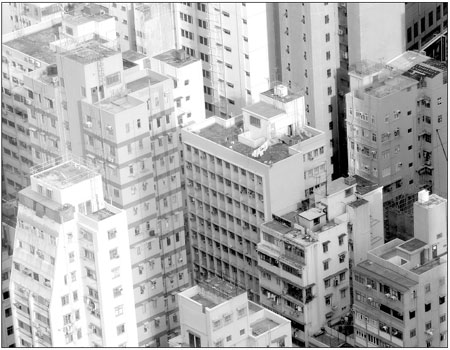City property market overheating: S
Updated: 2011-06-16 07:38
By Li Tao(HK Edition)
|
|||||||||
|
A bird's eye view of a Hong Kong residential neighborhood. The city's home prices have become unaffordable and the situation could weaken further if interest rates rise, S&P said on Wednesday. Mike Clarke / AFP |



Ratings agency increases the possibility of a sharp correction
Hong Kong's property market is overheating, raising the possibility of a sharp correction in prices, Standard & Poor's said in its latest property outlook.
The city's home prices have become unaffordable and the situation could weaken further if interest rates rise from their currently very low levels, S&P said in a report released on Wednesday.
The financial profiles of rated developers have improved since the downturn in 2008, and their credit profiles have a reasonably good buffer, particularly due to recurring rental income and increased geographic diversity, the ratings agency said.
However, increased expansion could moderate their financial positions and their profiles remain susceptible to volatility in the property market and increasingly higher land costs, according to the report.
It added that the current climate of strong liquidity could reverse because capital flows are fickle, and the city's soaring property market is also vulnerable to external shocks due to its open economy and free capital movement.
The ratings agency nevertheless maintained its "stable" outlook on the city's property sector due to Hong Kong's prudential regulations which will "likely soften the impact of a property market correction" and Hong Kong banks' tight underwriting standards.
The Hong Kong government has been "proactive" in introducing measures in the hope of stabilizing the city's property market, Fu Bei, director of corporate ratings at S&P, said during a teleconference call on Wednesday.
Last week, the government announced plans to double its land sales in the quarter to September 30 in a bid to curb soaring home prices. On the same day, the Hong Kong Monetary Authority ordered local lenders to tighten down-payment ratios for home buyers - the fourth time it has done so in the past two years.
Although tightening mortgages may depress local investment demand, it will work less effectively on mainland investors as a big proportion of them do not even borrow money from banks, said Fu.
Hong Kong's property transactions have fallen over the past six months after the government implemented a special duty to curb short-selling, but the city's overall home prices have continued to rise, surpassing the historical peaks set in 1997, according to government figures.
S&P believes the risk of policy overreaction on purchase restrictions is still low, and forecast that the policy will continue to tighten until property prices soften.
Mainland buyers are increasingly important investors in Hong Kong, particularly of high-end residential properties, the report indicated.
"A reduction in investment demand, possibly due to the mainland's economic and credit conditions, could set off a correction in the high-end property market with knock-on effects on mass-market prices," said the S&P report.
According to Nicole Wong, regional head of property research at investment bank CLSA, mainland buyers now constitute almost 40 percent of all transactions in the city for launches of new residential projects worth HK$12 million or more per unit.
"The average home price in the city faces less risk of a reverse but it will grow at a more moderate pace in the next 12 to 18 months," said Wong.
The S&P report also cut its outlook on the mainland property market to "negative" from "stable", indicating the tighter credit and further central government curbs may lead to a ratings downgrade in the next year.
China Daily
(HK Edition 06/16/2011 page2)
